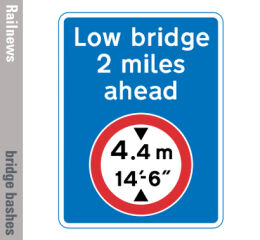Posted 20th November 2024 | 3 Comments
Careless lorry drivers hold up trains for three months

New figures released by Network Rail show that high lorries colliding with bridges caused over 100 days of delays for trains in the twelve months to March this year.
From 1 April 2023 to 31 March 2024 there were 1,532 reported bridge strikes, equal to one every six hours, which cost the rail industry around £20 million in delays, cancellations and repairs.
The new figures have come as Network Rail urges haulage operators and their lorry drivers to ‘Wise Up, Size Up’ and take better care on the roads.
Stuntney Road in Ely has the unflattering title of ‘Britain’s most bashed bridge’ as part of Network Rail’s annual compilation of big hitters – with 18 recorded incidents over the past year. Next worst were Stonea Road, Stonea and Lower Downs Road, Wimbledon, which were each bashed 17 times, or every three weeks on average.
Network Rail’s ‘Wise Up, Size Up’ campaign reminds lorry drivers to check the height of their vehicles and plan their route in advance to avoid low bridges.
Network Rail also has a team of bridge strike ‘champions’ covering each route, who visit haulage companies in their areas. The last two consecutive years has seen a reduction in the total number of incidents, with a 4 per cent reduction in the last year alone.
Improvements have been identified on a local level too. While Stonea is second on the list of recorded incidents for 2023/24, it did see an 11 per cent reduction in bridge strikes last year compared to the year before.
In February 2021 Network Rail’s engineers worked on a repair on the Cambridgeshire bridge that involved the installation of a new protection beam, designed to withstand future bridge strikes and making it stronger than before. This extra protection helps to reduce disruption to rail and road traffic in the event of future strikes. Cambridgeshire County Council also updated the road signs with its new height of 2 metres, which was unavoidably 10cm lower than before because of the new beam.
Network Rail’s group safety and engineering director Martin Frobisher said: ‘Every time a vehicle hits a bridge it can serious safety issues for road and rail users. To compound matters, these incidents can delay tens of thousands of passengers while we inspect the bridge and repair any damage, creating cost from public funds which should be used upgrading and improving our network.
‘We’ve done a lot of work with transport partners to tackle bridge strikes and it’s encouraging to see this is paying off with a general downward trend in the number of incidents. But with a strike every six hours there’s still much to do and we urge operators and drivers to properly plan their routes, know the height of their vehicles and be vigilant for road signs showing the height of bridges.
‘We will report those who don’t to the Traffic Commissioners and Network Rail always looks to recover the entire repair and delay costs from the driver and the operator.’
Reader Comments:
Views expressed in submitted comments are that of the author, and not necessarily shared by Railnews.

Greg T, London
If YOU damage a railway bridge - YOU pay for it
Why is this so difficult?
If these morons were made to pay, the fulll cost, every time, the problem would soon stop
Hugo rogers, Newbury
As above but every logistics company who bashes a bridge should immediately be charged 1? million . ?.
Neil Palmer, Waterloo
"which cost the rail industry around ?20 million in delays, cancellations and repairs"
Why should it cost the rail industry anything?
Isn't Network Rail going after the driver's insurance company, vehicle owner or the driver themselves to cover costs, or suing them in court?